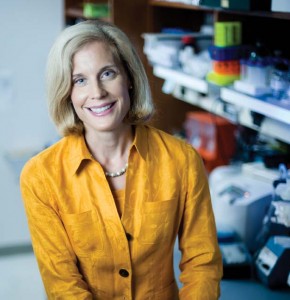Our Mission
November 21, 2013

Photo by Joe Howell
We’re strong and we’re advancing in our fight against cancer. That’s the feeling permeating Vanderbilt-Ingram Cancer Center, even as the health care industry faces unprecedented financial concerns and we proactively tighten our budgets here at Vanderbilt University Medical Center.
I’m reminded of the name of this magazine—Momentum. Every day I can feel the movement and progress we make in our mission to alleviate cancer death and suffering through patient care, education, research and community activities. The momentum of our previous 20 years propels us forward to, as this magazine’s tagline reads, “a future without cancer.”
You will see the scope of our mission in this issue, from investigation of molecules to individual patients to worldwide populations. At the molecular level, Stephen Fesik, Ph.D., is part of a national effort to discover drug targets for a frequently mutated protein in cancer called Ras, which plays a growth-promoting role in one-third of all human cancers. At the patient level, David Penson, M.D., MPH, is tracking outcomes of the various prostate cancer treatments, part of a larger effort to improve and individualize treatment. At the global level, we take a look at VICC’s worldwide impact, from China to Latin America, knowing that what we learn from diverse populations can benefit cancer patients everywhere.
Another indication of the Cancer Center’s strength is that we continue to compete at the top level for federal grants, industry sponsorship and foundation funding. Our investigators recently received $1 million in breast cancer research grant funds from Susan G. Komen, the largest nonprofit foundation supporting breast cancer research. These funds will support efforts to identify new biomarkers that will guide treatment decisions for patients, leveraging our expertise in personalized cancer treatment that specifically targets the unique features of each patient’s tumor. We also successfully competed for all of our “T32” cancer research training grant applications facing competitive renewal from the National Institutes of Health. These funds allow Vanderbilt faculty to advance training programs for graduate students and postdoctoral fellows, preparing the next generation of cancer researchers. These are just two of many examples of the support we continue to receive from a large community.
As Vanderbilt-Ingram continues to celebrate its 20th anniversary this year, I’m very optimistic about the years ahead. Even as we face economic challenges, we are still excelling and accelerating the translation of research discoveries to our community and to patients in the clinic. We’re constantly moving forward and our mission never wavers.
Sincerely,
Jennifer Pietenpol
